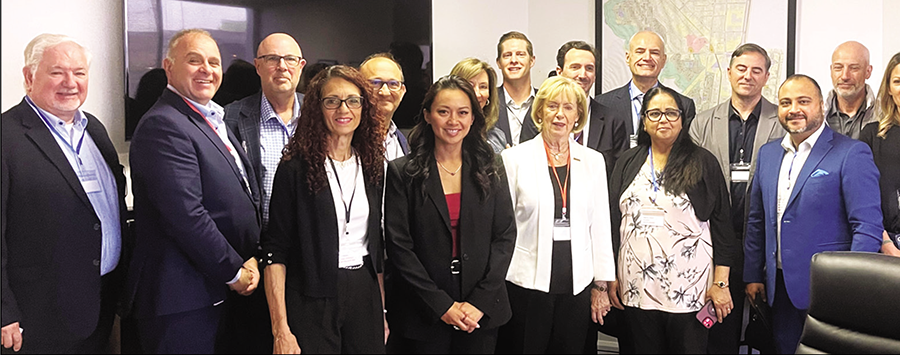 On September 3rd, Emery Village played host to a rare and important conversation, a federal roundtable that brought together local business leaders, MP Judy Sgro, and the Honourable Rechie Valdez, Minister of Women and Gender Equality and Secretary of State for Small Business and Tourism.
On September 3rd, Emery Village played host to a rare and important conversation, a federal roundtable that brought together local business leaders, MP Judy Sgro, and the Honourable Rechie Valdez, Minister of Women and Gender Equality and Secretary of State for Small Business and Tourism.
The meeting, organized by the Emery Village BIA and its Executive Director Sandra Farina, gave more than a dozen industry voices the chance to outline the challenges posed by U.S. tariffs, shifting trade rules, and mounting regulatory hurdles. With Emery’s 3,200 commercial, industrial, and retail businesses, it is one of Toronto’s key employment districts.
MP Judy Sgro set the tone, noting that even firms not directly hit by tariffs are feeling, “declining consumer spending, tighter investment decisions, and a general pullback. This is your opportunity to voice those concerns and help shape the federal response.”
Minister Valdez opened by saying, “I’m here to listen.” She reflected on her path—from banking to entrepreneurship and even a television baking venture—adding that experience taught her how often small businesses must do far more than any bio suggests.
From the start, speakers emphasized one theme above all: uncertainty.
Chemical / advanced coatings manufacturer Sean A. Chapman of Tempo Aerospace explained how tariff classifications can change overnight, wiping out years of planning. “Our products comply with trade agreements,” he said, “but it doesn’t matter if our steel packaging suddenly gets hit. We’ve set aside funds just to survive surprises. The rules are unpredictable.”
Food producers echoed the concern. Ritesh Kotak of Trupti Foods described how changes to U.S. customs rules — including lowering Section 321’s “de minimis” threshold — delayed direct-to-consumer shipments and spoiled products. “It’s a moving target,” he said. “We were shipping to the U.S. and suddenly needed new documentation. For perishables, that’s devastating. We need enforcement that also supports growth.”
Infrastructure and manufacturing firms shared similar frustrations. Geoff Britnell (CoreAqua) noted that American tenders often favour U.S. bidders, while Canadian contracts too often default to lowest price regardless of origin. “We have no benefit of being Canadian in our own backyard,” he said.
Robert Watson, President of Envyrozone, expanded on how uncertainty is chilling demand. His company employs about 250 people between its millwork facility in Emery and a metal shop in Etobicoke, supplying cabinetry for new-build condos, interiors for national retailers, and site furnishings many residents see every day. With roughly three-quarters of that work tied to U.S. customers, he said the problem isn’t only costs — it’s confidence. “Even when we’re competitive, some buyers don’t want to navigate changing rules. Projects get paused. In the meantime, our retailers here at home are trying to buy Canadian, but the public sector doesn’t always do the same.” He urged Ottawa to make federal and federally funded procurements reflect a fair Canadian content standard.
Transportation leader Vince Tarantini of Carmine Transportation Group underlined the day-to-day effects at the border. Trucks are stopped for shifting paperwork and unclear interpretations, he said, and companies hesitate to ship without clear rules. He also urged stronger, consistent standards for driver training. “If we want safer roads and a reliable supply chain, training can’t be superficial.”
Riverside Natural Foods co-founder Salma Fotovat spoke to the human side of workforce policy. Companies invest in training, she said, and then lose valued people when visa categories shift. “It’s heartbreaking to watch skilled, committed workers uprooted after years of contribution.” Several leaders asked for practical pathways that recognize on-the-job learning and stability for families already here.
Industry veteran Robert Cattle of the Canadian Tooling & Machining Association was brief but blunt: the country must rebuild its skilled workforce with real shop-floor learning and modern equipment in schools and plants. Without it, he warned, Canada risks losing its next generation of makers.
As the discussion drew to a close, Minister Valdez acknowledged the frustration and pledged to carry the message directly to Cabinet, where she was headed next. “The uncertainty is what I hear most clearly today,” she said. “Businesses can adapt to costs, but they need to know the rules won’t change overnight.” She noted that programs exist to support small business, but too often sit behind layers of bureaucracy, and she committed to push for greater transparency and fairness in procurement.
MP Judy Sgro praised Emery’s business community for its resilience and reaffirmed her commitment to ensuring local companies have a voice in Ottawa. The roundtable ended on a sober but hopeful note: Emery’s businesses are united, vocal, and determined to keep Canada’s manufacturing and service industries strong — if government can help level the playing field.

















